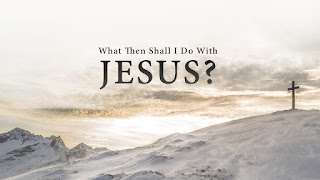What exactly is meant by 'Gospel'?
What is the Gospel?
In today’s culture, and sadly in many of our
churches, the term Gospel means different things to different people. This should not be the case, yet it is a
glaring reality. Let us first deal with
what the Gospel is not.
First of all, the Gospel is not simply
believing in God. Even the demons
believe that God is God and that He is one just like the Jews do, yet look
where the demons ended up (Jam. 2:19). When asking an individual about their religious background or spiritual
life, generally people will answer with something along the lines of having a
belief in God, however loose of a belief that may be. And to many in our world, this is sufficient
for being right with that god. This is
simply not the case. There is far more
to the Gospel than a surface-level, even superficial, belief in God, a god, or
in some “Higher Power.”
Second, the Gospel is not about being
a good person. The most common answer I
have experienced from people when witnessing to them about Jesus is that they
feel they are good people, good enough in fact to get to heaven. The argumentation is all too predictable: I
have done some bad things, but I have not killed anyone or raped anyone so when
I get to Judgment Day, and God judges me, I think He will see I have more good
than bad and I think He will/should let me into heaven. Scripture is abundantly clear that we all fall short of the necessary
standard of absolute moral perfection to enter heaven on our own merits (Rom.
3:23).
Third, the Gospel is not about being
religious or sincere in one’s beliefs.
This is a belief that has been around for ages, yet in our culture it
has been made popular by influential voices of celebrities, namely Oprah. Oprah’s proclamation on her television show
several years ago that it does not matter what one calls God as long as he or
she believes sincerely has become the battle cry of our progressive
culture. "All roads lead to heaven" is the
general belief among the masses, yet this is diametrically opposed to Scripture
and to the very words of Jesus.
Finally, the Gospel is not about
heritage or tradition. In other words,
one’s family faith or traditional belief system, even if it is Christian, does
not automatically bring some inherited salvation upon the entire family. A person is only forgiven and born again
through repentance and ultimately faith in the Person and work of Christ. Simply because a person’s parents,
grandparents or ancestors were believers in Christ does not make that person a
believer. Furthermore, growing up in a
local church or even “being born on the back pew”, to use a southern phrase, no
more makes someone a redeemed Christian than standing in the garage makes me a
car. Again, this view of the salvific
work of the Gospel is against that of Scripture.
So, what then is the Gospel? The Gospel is the message of the Almighty
Creator coming down to His broken, lost creation to save it from eternal
judgment and separation from Him in Hell.
God created mankind, beginning first with Adam and Eve. Everything God created, including those first
two human beings, was “very good” (Gen. 1:31).
Satan then entered the picture and
tempted Adam and Eve into going against the one command God had given them, to
not eat of the tree of the knowledge of good and evil. In so doing, innocence would have been lost,
sin would have entered the picture for the first time in human history, and the
relationship and fellowship between man and God would be broken. Adam and Eve fell for the temptation, they
sinned against God, and they were cast out of His presence into a newly cursed
world. The sin nature and the spiritual
deadness it brings would now be passed on to every human after Adam and Eve.
Over time, God began to work out His
plan of redemption for fallen mankind.
He so chose to form a people for Himself, a people who would represent
Him on the earth, to be the light in a dark world, and through whom ultimately
a Savior, the Messiah, would come. He
would give them peculiar laws, and they would be many, to demonstrate His call
for His people to be holy, or set apart, amongst the rest of the peoples of the
world. It would also demonstrate His own
holiness.
It would be a law that would bring a
heavy burden, a burden no man could ever uphold, thus sacrifices would need to
be made to atone for man’s continual sinning.
God made it clear that “life was in the blood” (Lev. 17:11) and since “the wages of sin is death” (Rom. 3:23), echoing the Garden curse (Gen.
2:17), a substitutionary death had to be made for sin, otherwise human death
would be required. All of this was to
point to the Lamb of God who would come to save His people once and for all.
Eventually, the prophesied Messiah,
found in the person of Jesus Christ of Nazareth, would arrive on the
scene. He would perform miracles, work
wondrous signs, and teach with greater authority than anyone had ever taught
before to prove He was the One prophesied to come. He would fulfill all the Old Testament
prophecies which spoke of Messiah and He would claim to be God (John
8:48-59). This would be the last straw
for those who had rejected Him.
When it was made clear who Jesus
claimed to be, the plans were set in motion by the Jewish religious leaders to
have Him killed. They felt that in
killing Jesus, they were doing the work of God, however, they did not realize
that they were playing right into the redemptive plan of God all along. It was arranged with one of His disciples,
Judas Iscariot, to betray Jesus into their hands while He was praying at a
prayer spot He frequented, the Garden of Gethsemane. From there, the trials would begin, followed
by being turned over to the Romans, horrendous beatings and scourging, and His
ultimate crucifixion on the cross.
At the cross, Jesus cried something
out before giving up His life in death.
Jesus proclaimed, “It is finished.” (John 19:30) Immediately after that,
the earth quaked and the veil in the temple that separated the Holy Place from
the Holy of Holies was torn in two. Jesus
would be buried shortly after, but as predicted, He would rise back to life
three days later defeating death on behalf of those who would believe. What did all this mean? It meant that final atonement had been made
for the sins of all who would repent and believe. It meant that the need for daily sacrifices
of lambs, goats, rams and doves for the sins of the people was over. It meant that there was no longer a need for
a priest in the temple. It meant that
the ultimate price of a perfect life that had kept the full Law of God had been
paid. It meant that the perfect
Advocate, High Priest, and Mediator between God and man, Jesus Christ, was
seated in His rightful position as the King!
And all who now come to Him in repentant faith, seeking Him as Lord and
Savior, will truly be saved and forgiven of all trespasses.
This is the Gospel. It is in the Gospel, and namely at the cross,
that we see love, grace, mercy, forgiveness, sacrifice, submission, judgment of
sin, and atonement.
To all who repent of their sins and
believe in Jesus Christ, calling upon Him to not only be Savior but Lord, will
be saved from the effects of sin and the judgment of Hell. To all who repent and believe, they will be
made sons and daughters of God as co-heirs with Christ in the Kingdom that is
being built which will one day reign for eternity on the New Earth under the
New Heaven – it will be the New Jerusalem.
This is the Gospel.



Comments
Post a Comment